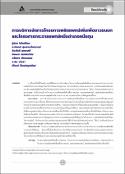บทคัดย่อ
การศึกษาวิจัยนี้มีวัตถุประสงค์เพื่อศึกษาการบริหารจัดการโครงการผลิตแพทย์เพิ่มเพื่อชาวชนบทและโครงการกระจายแพทย์หนึ่งอำเภอหนึ่งทุนโดยใช้การศึกษาเชิงคุณภาพ ประกอบด้วยการทบทวนเอกสาร การสัมภาษณ์เชิงลึกและการสัมภาษณ์กลุ่มผู้มีส่วนเกี่ยวข้องกับการบริหารจัดการโครงการจากหน่วยงานต่างๆ ได้แก่ สำนักงานปลัดกระทรวงสาธารณสุข, สำนักงานบริหารโครงการร่วมผลิตแพทย์เพิ่มเพื่อชาวชนบท, คณะแพทยศาสตร์, ศูนย์แพทยศาสตรศึกษาชั้นคลินิก, และสำนักงานสาธารณสุขจังหวัด จำนวน ๕๖ คน และทำการวิเคราะห์ข้อมูลเชิงเนื้อหา
ผลการศึกษา พบว่าสำนักงานบริหารโครงการร่วมผลิตแพทย์เพิ่มเพื่อชาวชนบทมีบทบาทหน้าที่รับผิดชอบต่อภาพรวมของโครงการทั้งหมด ทั้งในส่วนอำนวยการและธุรการของโครงการตั้งแต่การจัดทำโครงการเสนอต่อคณะรัฐมนตรี กำหนดโควตารับและเกณฑ์การรับสมัครนักศึกษา กำหนดระเบียบการใช้จ่ายงบประมาณและพัสดุ รวมถึงการติดตามความก้าวหน้าของนักศึกษาในโครงการและจัดเก็บฐานข้อมูลนักศึกษา คณะแพทยศาสตร์รับผิดชอบในการคัดเลือกนักศึกษาแพทย์และจัดการเรียนการสอนนักศึกษาชั้นปรีคลินิก และศูนย์แพทยศาสตรศึกษาชั้นคลินิกจัดการเรียนการสอนนักศึกษาชั้นคลินิก ทั้งสามหน่วยงานมีการประสานงานกันอย่างสม่ำเสมอ ในขณะที่สำนักงานสาธารณสุขจังหวัดมีบทบาทในการติดตามการทำสัญญาและการทำงานของบัณฑิตแพทย์ทั้งที่อยู่ภายใต้โครงการ รวมถึงบัณฑิตแพทย์ใช้ทุนในระบบปกติ ในส่วนการบริหารงบประมาณและบุคลากรใช้อ้างอิงตามสังกัดของหน่วยงาน ได้แก่ ระเบียบสำนักงานปลัดกระทรวงสาธารณสุข ระเบียบมหาวิทยาลัย และระเบียบโรงพยาบาลคู่ความร่วมมือ
บทคัดย่อ
This study aimed to explore administrative and management system of the Collaborative Project to
Increase Production of Rural Doctor (CPIRD), and the One Doctor One District (ODOD) programs by
using qualitative study methods: document reviews, in-depth interviews and group interviews of 56
stakeholders. The stakeholders consisted of the Office of Permanent Secretary, the Office of Collaborative
Project to Increase Production of Rural Doctor, medical faculties, medical education centres in affiliated
hospitals, and provincial health offices (PHOs). Content analysis was employed for data analysis.
The results showed that the Office of Collaborative Project to Increase Production of Rural Doctor
plays important roles for overall management including proposal endorsement to the cabinet, quotas and
the criteria for admissions determination, budget and procurement procedures, and student database
establishment. Medical schools are responsible for the selection of medical students and teaching medical
students in preclinical years while medical education centres have been taking care of students in clinical
years. All three units are highly coordinated and consistent. While the PHOs play vital role on monitoring
the contract and the work of the medical graduates under the project. The budget and personnel
administration are managed under the Ministry of Public Health regulations and universities.
This study recommended the Ministry of Public Health establishes long term status of the CPIRD
and ODOD program. In addition, it requires the improvement of management for overlapping location of
student recruitment by establishing the network among the program and medical schools according in
individual geographical areas. Moreover, promoting roles of PHOs in tackling with rural physician
shortage is recommended.


